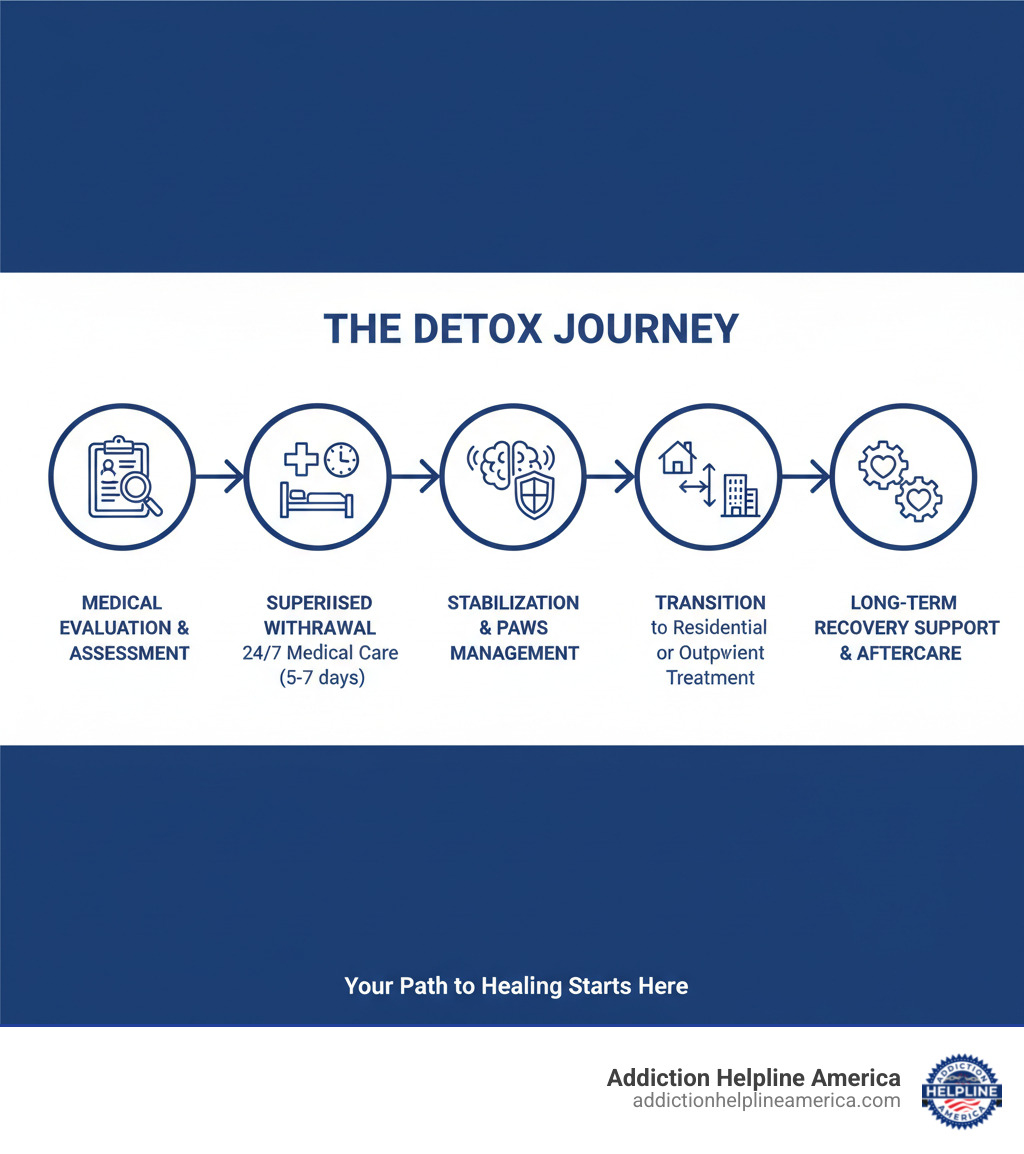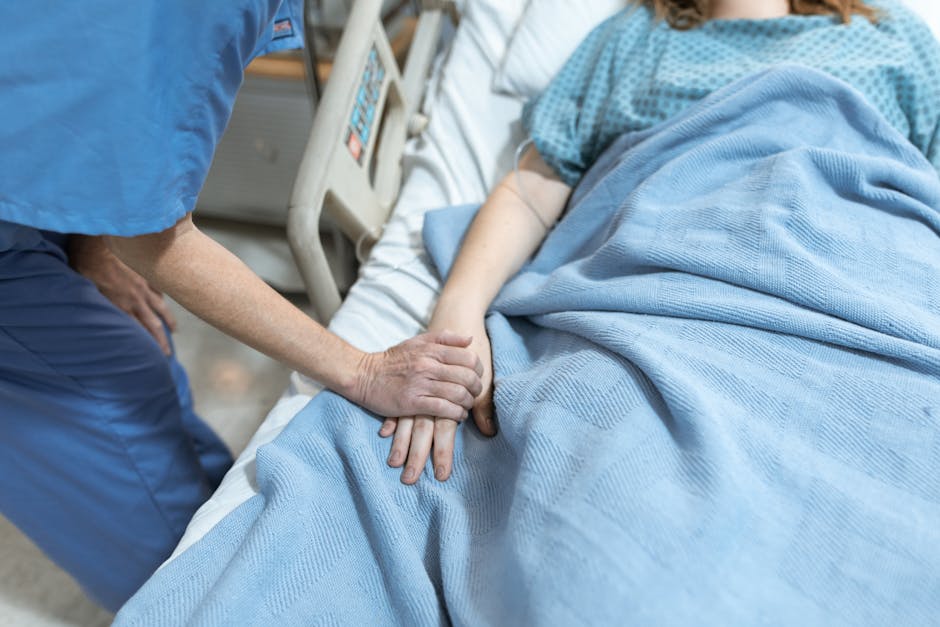
Understanding the Critical First Step Toward Recovery
A detox program near me is a medically supervised service designed to help individuals safely withdraw from drugs or alcohol. If you’re searching for immediate help, here’s what you need to know:
Quick Guide to Finding a Detox Program:
- Call a trusted helpline for 24/7 confidential support and referrals
- Use government resources like FindTreatment.gov or SAMHSA’s National Helpline (1-800-662-HELP)
- Verify insurance coverage – most plans cover at least part of detox costs
- Choose the right setting – inpatient (24/7 care) or outpatient (return home nightly)
- Expect 5-7 days for most detox programs, though duration varies by substance and individual needs
Deciding to seek help for addiction takes incredible courage. Professional detox programs provide a safe, medically supervised environment where withdrawal symptoms are managed by trained healthcare providers who understand what you’re going through.
Detoxification—the process of clearing addictive substances from your body—is the essential first step toward lasting recovery. However, attempting to detox alone can be dangerous or even life-threatening. Withdrawal from substances like alcohol, opioids, and benzodiazepines can cause severe complications including seizures, hallucinations, and delirium tremens. This is why medical supervision isn’t just recommended—it’s often medically necessary.
The severity of withdrawal varies, but a professional detox program provides around-the-clock monitoring, medication to ease symptoms, and immediate intervention if complications arise.
At Addiction Helpline America, we connect individuals and families with accredited detox programs custom to their unique needs. We provide free and confidential guidance to help you find the right detox program near me that accepts your insurance. Our mission is to ensure that no one faces withdrawal alone and that everyone has access to the safe, compassionate care they deserve.

Know your detox program near me terms:
Understanding Detox: What It Is and Why It’s Crucial
What is a Drug and Alcohol Detox Program?
A drug and alcohol detox program is the medically supervised process of clearing toxic substances from your body in a safe, clinical setting. This is not just “sleeping it off”; it’s a structured intervention where medical staff provide 24-hour care to manage complications and ease discomfort. Most detox programs last about five days, though the timeline varies.
The goal is stabilization—reaching a substance-free state so you can effectively engage in the deeper work of recovery. Without this foundation, the discomfort of withdrawal can derail the strongest commitment to getting sober. As the National Institute on Drug Abuse (NIDA) emphasizes, treatment needs to be readily available. Detox opens the door to everything that comes next. The Principles of Drug Addiction Treatment from NIDA offers excellent insight into effective treatment.
The Dangers of Detoxing at Home
Attempting to detox at home without medical supervision can be dangerous and sometimes deadly. While handling this privately is an understandable desire, the risks of going it alone are simply too high.
When you suddenly stop using a substance your body has become dependent on, you can face a medical emergency. Potential complications include depression, anxiety, tremors, seizures, hallucinations, and even cardiac arrest. Suicidal thoughts are also common during unsupported withdrawal. These are documented risks that medical professionals are trained to prevent and manage.
Call Now – Your Journey to Recovery Begins Today!

Take the first step towards a healthier life! Call now to connect with our compassionate team and start your recovery journey today. Your path to healing awaits!
Our recovery specialists are available 24/7 to provide support, and all calls are confidential and free. Reach out anytime – we’re here to help!
For example, alcohol withdrawal can progress to Delirium Tremens (DTs), a severe syndrome that can be fatal without immediate medical intervention. Opioid withdrawal causes such profound misery that complications like dehydration become serious concerns. Benzodiazepine withdrawal carries a high risk of seizures, which can occur days after the last dose.
A professional detox program removes much of the fear of withdrawal by ensuring you are safe, monitored, and as comfortable as possible.

Common Withdrawal Symptoms
Withdrawal symptoms vary based on the substance used, duration of use, and your individual physiology. This is why personalized medical care is so important.
Alcohol withdrawal can escalate quickly from anxiety and shakiness to hallucinations and seizures, making medical monitoring essential.
Opioid withdrawal is often compared to a severe flu, with intense muscle aches, nausea, vomiting, and powerful cravings. Complications like severe dehydration can become dangerous.
Benzodiazepine withdrawal is particularly dangerous and requires a slow, medically supervised taper. Stopping suddenly can trigger seizures, severe anxiety, and even psychosis, making professional oversight a medical necessity.
Stimulant withdrawal from substances like cocaine or methamphetamine is primarily psychological but no less brutal. It’s marked by crushing depression, overwhelming fatigue, and relentless cravings. The psychological distress can lead to dangerous situations, including suicidal thoughts.
A detox program near me ensures that whatever symptoms arise, you’re not facing them alone. Medical staff can provide medications and support, turning a potentially traumatic experience into a safe, manageable first step toward lasting recovery.
Exploring the Different Types of Detox Programs
Once you decide to seek help, the next step is choosing the right detox program near me. Treatment isn’t one-size-fits-all, and understanding your options will help you make an informed choice.
Inpatient vs. Outpatient Detox
The two primary types of detox are inpatient and outpatient, differing in where you stay and the level of medical supervision.
Inpatient (Residential) Detox means you live at the facility, receiving 24/7 medical monitoring and support. The structured environment is removed from daily triggers, making it the safest option for severe addiction, a history of complicated withdrawals, or an unstable home environment.
Outpatient Detox allows you to attend a clinic for medical supervision during the day and return home at night. This option can work for individuals with less severe dependencies and a strong, supportive home environment, but it requires significant self-discipline.
| Feature | Inpatient (Residential) Detox | Outpatient Detox |
|---|---|---|
| Level of Supervision | 24/7 medical monitoring and support | Scheduled visits to a clinic; medical supervision during treatment hours |
| Environment | Structured, controlled, removed from external triggers | Allows patients to remain at home and continue daily responsibilities |
| Ideal Candidate | Severe addiction, high risk of severe withdrawal, co-occurring mental health issues, unstable home environment | Less severe addiction, strong support system at home, no severe medical complications |
| Duration | Typically 5-7 days, can be longer for complex cases | Varies, often daily visits for a week or more |
Unsure which setting is right for you? Addiction Helpline America can assess your situation and help you find the detox program near me that’s the best fit.
How Long Does a Typical Detox Program Last?
There’s no universal timeline for detox, as it varies from person to person. Most detox programs last 5-7 days, which is enough time for most people to stabilize physically. However, some may complete a shorter 3-day detox for mild symptoms, while others may need an extended detox of 10-14 days or longer, especially when tapering off certain substances.
Factors influencing the duration include the type of substance, the length and severity of use, your overall physical health, and any co-occurring mental health disorders. The goal is to get through withdrawal safely and comfortably, not quickly. Your medical team will assess your progress and adjust your treatment plan as needed.
Specialized Detox Options
Beyond standard settings, specialized services are available for urgent situations and specific needs.
Same-day emergency detox centers exist for people who need immediate help. If you’re experiencing dangerous withdrawal symptoms like seizures, hallucinations, or suicidal thoughts, a same-day admission could save your life. These centers prioritize immediate medical stabilization.
Many programs also incorporate holistic approaches alongside medical treatment. While medications handle physical symptoms, complementary therapies support your mental and emotional well-being. These can include nutrition counseling to repair the body, yoga and meditation to manage stress, and supportive therapies to begin building coping skills. This whole-person approach helps set a stronger foundation for lasting recovery.
Call Now – Your Journey to Recovery Begins Today!

Take the first step towards a healthier life! Call now to connect with our compassionate team and start your recovery journey today. Your path to healing awaits!
Our recovery specialists are available 24/7 to provide support, and all calls are confidential and free. Reach out anytime – we’re here to help!
How to Find a Detox Program Near Me
Finding the right treatment center when you’re ready for recovery can feel overwhelming, but you don’t have to figure it out alone. There are trusted resources to help you find a detox program near me that fits your situation.
Using Trusted Resources to Find a Detox Program Near Me
At Addiction Helpline America, we offer free, confidential guidance to connect you with a program that meets your needs and accepts your insurance. Government resources are also invaluable. SAMHSA’s National Helpline (1-800-662-HELP or 4357) operates 24/7, offering confidential treatment referrals. You can also visit their National Helpline page online.
Another powerful tool is FindTreatment.gov, a confidential platform that helps you locate treatment facilities across the U.S. You can access their services at FindTreatment.gov and watch their FindTreatment.gov Overview for guidance.
If you’re in immediate crisis, the 988 Suicide & Crisis Lifeline provides free, confidential support 24/7. For crisis counseling related to disasters, the Disaster Distress Helpline at 1-800-985-5990 is available, with more information on the Disaster Distress Helpline page.

When you reach out, having your location, substance use history, and insurance information ready will help narrow down the best options. There’s no judgment—just people who want to help you find care.
Key Questions to Ask When Choosing a Program
Not all detox programs are equal. Asking the right questions can help you find a program that gives you the best chance at lasting sobriety.
- Is the facility licensed and accredited? This ensures the program meets safety standards and signals a commitment to quality care.
- What is the staff-to-patient ratio? A lower ratio typically means more individualized attention and closer monitoring.
- Do you create individualized treatment plans? Effective detox requires a personalized approach, not a one-size-fits-all protocol.
- Do you offer Medication-Assisted Treatment (MAT)? For opioid or alcohol dependence, MAT can ease withdrawal, reduce cravings, and improve success rates.
- Do you treat dual diagnosis? If you have a co-occurring mental health issue, ensure the program treats both conditions simultaneously.
- What happens after detox? A quality program will have clear pathways to continue your care, as detox is only the first step.
Finding Specialized Detox Services
Recovery isn’t one-size-fits-all, and your path may require specialized care. Many programs offer services designed for specific populations, creating a safe and understanding environment.
- Dual diagnosis or co-occurring disorders treatment is essential for those with both addiction and a mental health condition like depression or anxiety.
- Programs for veterans and first responders understand the unique traumas and stressors of these professions, often incorporating trauma-informed care and peer support.
- LGBTQ+ affirming care programs provide a safe, inclusive environment free from judgment, addressing the specific challenges this community may face.
- Gender-specific programs for men or women can help individuals feel more comfortable opening up about sensitive issues.
- Programs for professionals offer discreet settings for those who need to maintain privacy due to career responsibilities.
When you connect with Addiction Helpline America, we help you identify a detox program near me with the specialized services you need. It’s about finding a place where you’ll feel understood and supported.
The Medical Side of Detox: What to Expect
Understanding what happens during medical detox can help ease anxiety and prepare you for this crucial first step. Let’s walk through the clinical side of the process, from intake to payment.
The Intake and Evaluation Process
When you arrive at a detox program near me, you’ll go through a comprehensive intake and evaluation. This compassionate assessment is designed to keep you safe and create a treatment plan custom to your unique situation.
The process includes an initial assessment of your substance use history, a biopsychosocial evaluation of your physical and mental health, and a thorough medical history review. All of this information comes together to create a personalized treatment plan that outlines your medications, monitoring level, and transition to the next phase of care. At Addiction Helpline America, we can help you understand what to expect and prepare for your intake.
Medications Used During Medical Detox
One of the biggest fears about detox is the discomfort of withdrawal. Modern medical detox uses Medication-Assisted Treatment (MAT) to make the process significantly safer and more comfortable by easing symptoms and reducing cravings.

The specific medications used depend on the substance you’re withdrawing from.
- For alcohol withdrawal, benzodiazepines like lorazepam are often used to prevent dangerous seizures and reduce anxiety.
- For opioid withdrawal, medications like buprenorphine (Suboxone) relieve withdrawal symptoms and cravings without creating a high. Methadone is another option, typically administered in specialized programs. After detox, naltrexone (Vivitrol) can be used to block the effects of opioids and prevent relapse.
Your medical team may also use other medications to manage specific symptoms like anxiety, nausea, or insomnia. You don’t have to suffer through withdrawal without relief. For more information, visit the Information on Medication-Assisted Treatment from SAMHSA.
Does Insurance Cover a Detox Program Near Me?
Cost is a major concern, but the good news is that most insurance plans now cover detox and addiction treatment. The Affordable Care Act (ACA) and the Mental Health Parity and Addiction Equity Act (MHPAEA) require most health plans to cover substance use disorder treatment comparably to other medical conditions.
Call Now – Your Journey to Recovery Begins Today!

Take the first step towards a healthier life! Call now to connect with our compassionate team and start your recovery journey today. Your path to healing awaits!
Our recovery specialists are available 24/7 to provide support, and all calls are confidential and free. Reach out anytime – we’re here to help!
Verifying your insurance is a crucial step, as coverage varies widely between plans. You’ll want to understand what you’ll be responsible for paying out-of-pocket. This is where we can help. When you call Addiction Helpline America, we can verify your benefits, explain what your plan covers, and help you understand the difference between in-network and out-of-network facilities.
If you don’t have insurance, don’t let that stop you from seeking help. Other payment options exist. Some facilities offer private pay options with payment plans, sliding scale fees based on your income, or are state-funded for individuals who meet certain criteria. Financial concerns should never be a barrier to getting the help you need.
Life After Detox: The Journey to Lasting Recovery
Why Detox Is Only the First Step
Completing detox is a powerful accomplishment, but it’s important to understand that detox alone is not a cure for addiction. Think of it as removing a splinter: the immediate crisis is over, but the wound still needs care to heal. Detox clears substances from your body, but the mental and emotional patterns that drove your substance use are still there.
Addiction involves both physical and psychological dependence. The triggers, habits, and coping mechanisms that fueled your addiction remain after detox, which is why therapy and ongoing support are essential for long-term recovery.
A common challenge is Post-Acute Withdrawal Syndrome (PAWS), a normal part of the brain healing that can bring frustrating symptoms like mood swings, anxiety, fatigue, and poor concentration weeks or even months after your last use. Understanding that PAWS is temporary and manageable—and having the right support—is key to staying on track.
Transitioning to the Next Level of Care
Because detox is just the beginning, what happens next is equally important. At Addiction Helpline America, we help connect you with the right next step based on your individual needs.
- Residential treatment programs (inpatient rehab) provide an immersive healing environment where you live at the facility for 30, 60, or 90 days, focusing entirely on healing through intensive therapy.
- Partial Hospitalization Programs (PHP) offer a middle ground, with intensive treatment during the day while you return home or to a sober living facility at night.
- Intensive Outpatient Programs (IOP) provide more flexibility, with treatment sessions a few days per week, allowing you to maintain work or family responsibilities.
These programs use evidence-based therapies like Cognitive Behavioral Therapy (CBT) to change harmful thought patterns and Dialectical Behavior Therapy (DBT) to manage intense emotions. Treatment often includes individual, group, and family therapy to build a strong foundation for recovery.
Building a Lifelong Support System
You cannot do this alone, and you shouldn’t have to. Building a strong support system is essential for lasting sobriety, as recovery is an ongoing journey.
- Aftercare planning creates a personalized strategy to support your recovery after formal treatment, identifying triggers and connecting you with resources.
- Alumni groups offer powerful peer support from others who have completed the same program.
- 12-Step programs like Alcoholics Anonymous (AA) and Narcotics Anonymous (NA), along with alternative support groups like SMART Recovery, offer free, community-based peer support.
- Family therapy helps repair damaged relationships and teaches family members how to support your recovery without enabling.
- Continuing individual therapy provides ongoing professional support as you steer the challenges of life in sobriety.
Seeking help is a sign of strength. If you’re in crisis or struggling with thoughts of self-harm, please reach out immediately. Call or text the 988 Suicide & Crisis Lifeline for free, confidential support available 24/7. You are not alone.
Conclusion: Take the First Step Toward a New Life
Searching for a detox program near me is about choosing life, hope, and a better future. We’ve walked through why detox is a safe, effective, and medically necessary first step, but it’s just the beginning. The real work of recovery happens through therapy, support systems, and addressing the deeper reasons behind addiction.
Here’s what we want you to remember: Recovery is not just possible—it’s happening right now for countless people. People who once felt as scared and overwhelmed as you might feel today. You are not alone in this struggle, and you don’t have to face it alone.
At Addiction Helpline America, our mission is to ensure everyone gets help. We offer free, confidential, and personalized guidance to help you find the right detox program near me that accepts your insurance and fits your unique situation. Our vast network of accredited treatment centers spans the United States, and we’re here to connect you with a program that understands what you’re going through.
We know that taking this step is terrifying. We know you might be worried about the cost, about what people will think, or about failing. But asking for help isn’t weakness—it’s one of the bravest things you can do. The only way to fail is to not try at all.
Your new life is waiting for you. It’s a life where you wake up clear-headed, where you’re present for the people you love, and where you feel proud of yourself again. That life is real, and it’s within your reach.
Don’t let fear or uncertainty hold you back. Take the first step today. Your recovery journey starts with a single phone call, a single decision, a single moment of courage.
Find the right alcohol and drug addiction treatment program for you
Our helpline is 100%
free & confidential
If you or someone you care about is struggling with drug or alcohol addiction, we can help you explore your recovery options. Don’t face this challenge alone—seek support from us.
Programs
Resources
Will my insurance
cover addiction
treatment?
We're ready to help
Find the best
drug or alcohol treatment
center
Are you or a loved one struggling with addiction? Call today to speak to a treatment expert.















